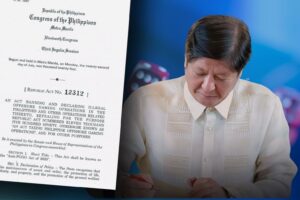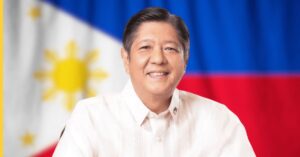MANILA, Philippines – In a landmark policy shift that definitively ends a contentious chapter in the country’s economic history, President Ferdinand R. Marcos Jr. has signed into law the Republic Act (RA) 12312, known as the “Anti-POGO Act of 2025.” The signing ceremony, held on October 23, 2025, formalized the total prohibition of all Philippine Offshore Gaming Operators (POGOs) and related services, establishing the ban as a permanent criminal statute.
This new law represents a powerful legislative culmination of a months-long executive-led crackdown, prioritizing the nation’s social stability, public safety, and integrity over the significant but ethically fraught revenue streams the industry once provided.

The Great Repeal: From Taxation to Total Prohibition
RA 12312 immediately repeals Republic Act No. 11590, which had previously regulated and imposed taxes on offshore gaming licensees and their service providers operating within the Philippines. The transition from a fiscal framework—treating POGOs as a legitimate, albeit heavily regulated, tax-generating sector—to an absolute prohibition underscores a fundamental re-evaluation of the industry’s net impact on the Filipino society.
The core intent of the “Anti-POGO Act of 2025” is rooted in the highest principles of governance. The law’s declaration of policy serves as the moral justification for the economic sacrifice:
“The State recognizes that the maintenance of peace and order, the protection of life, liberty, and property, and the promotion of the general welfare are paramount for the meaningful enjoyment of democracy. The State likewise values the dignity of every human person and guarantees full respect for human rights,” the new law states.
By explicitly linking the ban to the protection of human dignity and public order, the government has framed the prohibition as a moral and national security imperative, asserting that the social costs associated with POGO operations are simply too high to justify any economic benefits.
Genesis of the Ban: A Chain of Executive and Legislative Action
The legislative momentum for the total ban was catalyzed by a series of high-profile executive actions. President Marcos Jr. had signaled his clear intent during his State of the Nation Address (SONA) on July 22, 2024, citing a sharp rise in organized crimes directly associated with POGO hubs, including human trafficking, torture, and severe financial fraud. The President declared that banning all POGOs was necessary to “solve many of the problems the Philippines is encountering.”
This rhetoric was swiftly followed by concrete action. In November 2024, citing pervasive national security and public order risks, President Marcos issued Executive Order No. 74, which imposed an immediate ban on offshore and internet gaming. EO 74 laid the crucial groundwork by asserting the State’s “paramount duty to safeguard national security, maintain public order, uphold the rule of law, protect the safety of its citizens, and ensure the integrity of the social fabric of the nation.”
The legislature quickly moved to codify this executive mandate. The bill, initially designated as Senate Bill No. 2868, passed the Senate on June 9, 2025, with overwhelming support, and was adopted by the House of Representatives as an amendment to House Bill No. 10987 on June 11, 2025, indicating a rare, cross-party consensus on the urgency of the matter.
Severe Penalties and Strict Enforcement

The new law is fortified with a stringent penal framework designed to ensure its effective implementation and deter recidivism. Violators face escalating penalties for repeat offenses:
Offense Category
Imprisonment Term
Fine Range (Philippine Pesos)
First Offense
6 to 8 years
PhP300,000 to PhP15 million
Second Offense
8 years and 1 day to 10 years
PhP15 million to PhP30 million
Third Offense
10 years and 1 day to 12 years
PhP30 million to PhP50 million
The act also outlines specific, non-negotiable penalties for certain categories of offenders:
-
Public Officials or Employees: If the offender is a government official or employee, the maximum penalty applicable to the offense category will be automatically imposed. This provision is a clear effort to insulate law enforcement and regulatory bodies from corruption and collusion, which had been a persistent issue during the POGO era.
Foreign Nationals: Foreigners found guilty of violating the new law will be subject to immediate deportation after serving their sentence and will be permanently banned from re-entering the Philippines. This ensures the permanent removal of transnational criminal elements linked to the prohibited operations.
Furthermore, the law explicitly revokes all existing licenses and permits issued to POGOs and associated service providers by the Philippine Amusement and Gaming Corporation (PAGCOR), special economic zones, and other authorities. All Alien Employment Permits (AEPs) and work visas issued to POGO-related workers are also canceled, shutting down the labor pipeline for the now-illegal industry.
Initial Political Reactions and Societal Impact
The signing of RA 12312 has been met with enthusiastic approval from long-standing critics of the industry. Senator Risa Hontiveros, a key figure in the Senate investigations, expressed that she was “overjoyed about the Anti-POGO Act’s passage into law.” Hontiveros, who chaired the Senate Committee on Women, Children, Family Relations, and Gender Equality that exposed many POGO-linked crimes, stressed that the law finally rectifies a “mistake of the previous administration” that allowed an industry to flourish while “abusing and exploiting not just people, but also institutions.”
Fellow legislators, including Senator Sherwin Gatchalian, the principal author of the measure, echoed the sentiment, stating that the law was a direct response to the “POGO menace” which had brought a surge in criminalities, including kidnapping, human trafficking, and prostitution. Gatchalian emphasized: “This isn’t just an economic issue but a moral imperative.”
While proponents celebrate the victory for social order, the government is simultaneously tasked with mitigating the economic fallout. Despite the high social costs, the industry was a major contributor to the real estate sector and employed thousands of Filipino citizens. The new law tasks the Department of Labor and Employment (DOLE) with formulating and implementing transition plans and programs—including reskilling and re-employment assistance—to aid the affected Filipino workers.
The “Anti-POGO Act of 2025” thus establishes a powerful precedent. It is a decisive governmental statement that even in pursuit of economic growth, a nation’s values, public safety, and commitment to human rights must remain the ultimate measure of acceptable business activity. The focus now shifts from the legal signing to the complex, on-the-ground task of enforcement and economic transition.





